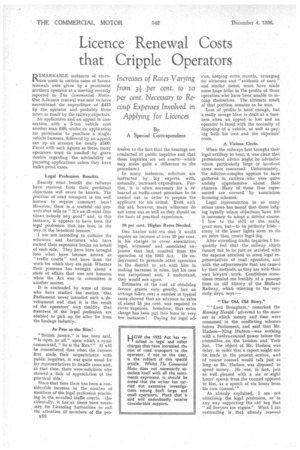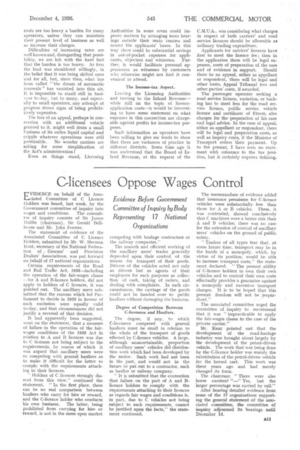Licence Renewal Costs that Cripple Operators
Page 44

Page 45

If you've noticed an error in this article please click here to report it so we can fix it.
Increases of Rates Varying from 3i per cent. to IC) per cent. Necessary to Recoup Expenses Involved in Applying for Licences By A Special Correspondent REMARKABLE instances of excessive costs in certain cases of licence renewals were given by a prominent northern operator at a meeting recently reported in The Commercial Motor. One A-licence renewal was said to have necessitated the expenditure of £475 by the operator and probably three times as much by the railway objectors.
An application and an appeal in connection with a 5-ton vehicle cost another man £60, whilst an application for permission to purchase a singlevehicle business, followed by an appeal, ran up an account for nearly £100. Faced with such figures as these, many operators must be assailed by grave doubts regarding the advisability of pursuing applications unless they have bullet-proof cases.
Legal Profession Benefits.
Exactly what benefit the railways have received from their persistent objections will never be known. The position of road transport is too well known to require comment here! However, there is a truthful old proverb that tells us "It's an ill-wind that blows nobody any good" and, in this instance, it appears to have been the legal profession that has been in the way of the beneficial breezes,
I am not intending to criticize the solicitors and barristers who have racked their expensive brains on behalf of each side. They have been brought into what have become known as " traffic courts" and have done the work for which they are paid. Whether their presence has brought about a state of affairs that was not foreseen when the Act was in committee is another matter.
It is contended by some of those who have studied the matter, that Parliament never intended such a development and that it is the result of the operators' own timidity that members of the legal profession are enabled to pick up fee after fee from the haulage industry.
As Free as the Ritz!
"British justice," it has been said, " is open to all," upon which a cynic commented, " So is the Ritz!" It will be remembered that when the carriers first made their acquaintance with public inquiries, it was quite usual for lay representatives to handle cases and, at that time, there were solicitors who showed a lack of appreciation of the practical side.
Since that time there has been a considerable increase in the number of members of the legal profession practising in the so-called traffic courts. (Incidentally, it has at times been necessary for Licensing Authorities to call the attention of members of the pro
n10 fession to the fact that the hearings are conducted at public inquiries and that these inquiries are not courts—which may make quite a difference to the procedure.) In many instances, solicitors are instructed by lay experts, with, naturally, increased expenditure. Further, it is often necessary for a rehearsal oi traffic-court procedure to be carried out in order to prepare the applicant for his ordeal. Even with this aid, however, many witnesses do not come out so well as they should on the basis of practical experience.
10 per cent. Higher Rates Needed.
One haulier told me that it would require an increase of over 10 per cent. in his charges to cover association, legal, witnesses' and associated expenses that had resulted from the operation of the 1933 Act. He endeavoured to persuade other operators in the district to act with him in making increases in rates, but his case was exceptional and, I understand, they would not agree.
Estimates of the cost of obtaining licence grants vary greatly, but an average taken over a number of typical cases showed that anadvance in rates of about 34 per cent, was required to cover expenses. Somehow, that extra charge has been put into force in very few instances! Paying for legal ad
vice, keeping extra records, arranging for witnesses and "evidence of need" and similar items, must have made some huge holes in the profits of those operators who have been unable to recoup themselves. The ultimate result of that position remains to be seen.
Loss of profits is hard enough, but a really savage blow is dealt at a business when an appeal is lost and an operator is faced with the necessity of disposing of a vehicle, as well as paying both his own and the objectors' costs.
A Vicious Circle.
When the railways first brought their legal artillery to bear, it was clear that professional advice might be advisable where particularly large or involved cases were concerned. Unfortunately, the solicitor-complex appears to have gathered in carriers who were quite unduly apprehensive about their chances. Many of those thus represented are covered by association licensing schemes.
Legal representation in so many minor cases has meant that those lodging equally minor objections have felt it necessary to adopt a similar course. I bow to the skill of the really great men, but—to be perfectly Irish— many of the lesser lights seem to do no more than create legal fog.
After attending traffic inquiries I frequentlyfeel that the railway chiefs cannot fail to be just as satisfied with the expense attached to some legal representatives of road operators, and with the adjournments that are caused by their methods, as they are with their own lawyers' work. Conditions sometimes remind me forcibly of a passage from an old history of the Midland Railway, which referring to the very early days, says :— " The Old, Old Story."
"
'Lord Brougham,' remarked the Morning Herald 'adverted to the manner in which money and time were consumed in the conflicting schemes before Parliament, and said that Mr. Hudson—King Hudson—was working with a twelve-counsel power before the committee on the London and York line. The object of Mr. Hudson was delay, in order that a report might not be made in the present session, and of course counsel would talk just as long as Mr. Hudson was disposed to spend money. He was, in fact, just as well pleased with a six or eight hours' speech from the counsel opposed to him, as a speech of six hours from his own counsel.'" As already explained, I am not criticizing the legal profession, or in any way supporting the old tag that "all lawyers are rogues." What I am contending is that already renewal
costs are too heavy a burden for many operators, unless they can maintain their present level of business as well as increase their charges.
Difficulties of increasing rates are • well known and, disregarding that possibility, we are left with the hard fact that the burden is too heavy. At first the load was shouldered willingly, in the belief that it was being shifted once and for all, but, since then, what has been called "the dream of automatic renewals" has vanished into thin air. It is impossible to stand still in business to-day, but to many, and especially to small operators, any attempt at progress shows signs of being prohibitively expensive.
The loss of an appeal, perhaps in connection with an additional vehicle granted to it, might well drain a small business of its entire liquid capital and cripple whatever operations were still permissible. No wonder carriers are asking for some simplification of the Act's administration!
Even as things stand, Licensing Authorities in some areas could improve matters by arranging more hearings outside their main centres and nearer the applicants' bases. In this way there could be substantial savings in out-of-pocket expenses for applicants, objectors and witnesses. Further, it would facilitate personal appearances as witnesses by customers who otherwise might not find it convenient to attend.
The Ineesne-tax Alpert.
Leaving the Licensing Authorities and turning to the Inland Revenue-while still on the topic of licenceapplication costs—it would be interesting to have some statement on avhast expenses in this connection are chargeable against profits for income-tax purposes.
Such information as operators have been willing to give me tends to show that there are variances of practice in different districts. Some time ago it was understood that the Board of Inland Revenue, at the request of the C.M.U.A., was considering what charges in respect of both carriers' and road .service licences should be allowable as ordinary trading expenditure.
Applicants for carriers' licences have first to meet the licence fee ; then in the application there will be legal expenses, costs of preparation of the case and of evidence in support. Should there be an appeal, either as appellant or respondent, there will be legal and other 'Costs, Appeal Tribunal fees and. other parties' costs, if awarded.
The passenger operator seeking a road service licence, variation, or barking has to meet fees for the road service licence, public service vehicle licence and certificate of fitness, also charges for the preparation of his case and legal advice. In the case of appeal, either as appellant or respondent, there will be legal and preparation costs, as well as inquiry costs, if the Minister of Transport orders their payment. lip to the present, I have seen no statement with reference to the tax position, but it certainly requires defining.




























































































